| Information
Service of
the Serbian Orthodox Church
March 31,
2005

SERBIAN
ORTHODOX CHURCH DELEGATION
VISITS RABBI ARTHUR SCHNEIER
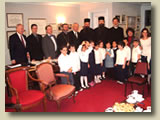 On
Tuesday, March 29, the delegation of the Serbian Orthodox Church
presently visiting the USA met with Rabbi Arthur Schneier, the
president of the Appeal of Consciousness Foundation, and his deputy,
Michael Eisenstadt in the Rabbi Arthur Schneier Foundation Building
in New York. On
Tuesday, March 29, the delegation of the Serbian Orthodox Church
presently visiting the USA met with Rabbi Arthur Schneier, the
president of the Appeal of Consciousness Foundation, and his deputy,
Michael Eisenstadt in the Rabbi Arthur Schneier Foundation Building
in New York.
Rabbi
Schneier and his associates, who facilitate dialogue between religious
communities throughout the world with the goal of establishing
peaceful, mutual co-existence, assisted in the realization of
the first meeting between Serbian Orthodox Bishop Artemije and
leaders of other Kosovo religious communities (Muslim and Roman
Catholic) in Vienna in 1998. The New York meeting was also attended
by Archbishop Barsamian of the Armenian Church in the USA.
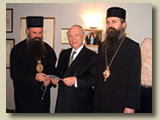 Rabbi
Arthur Schneier warmly welcomed the members of the Serbian Orthodox
Church delegation, recalling that he also received a visit from
His Holiness Serbian Patriarch Pavle in 1991. On that occasion,
Rabbi Schneier noted, they discussed how to stop the bloodshed
in the former Yugoslavia. They decided that religious leaders
should meet in Switzerland, which represented the beginning of
cooperation that later continued. Rabbi Schneier also remembered
meeting with Bishop Artemije in Vienna, as well as with the Mufti
of Kosovo and the Roman Catholic Bishop of Kosovo. Rabbi
Arthur Schneier warmly welcomed the members of the Serbian Orthodox
Church delegation, recalling that he also received a visit from
His Holiness Serbian Patriarch Pavle in 1991. On that occasion,
Rabbi Schneier noted, they discussed how to stop the bloodshed
in the former Yugoslavia. They decided that religious leaders
should meet in Switzerland, which represented the beginning of
cooperation that later continued. Rabbi Schneier also remembered
meeting with Bishop Artemije in Vienna, as well as with the Mufti
of Kosovo and the Roman Catholic Bishop of Kosovo.
Bishop
Grigorije emphasized that the delegation he heads represents the
whole Serbian Orthodox Church and that the purpose of its visit
is to establish dialogue with all significant factors in the USA
who are able to contribute to peace and the normalization of life
in Kosovo and Metohija as well as throughout the region. "We
are young in age but the difficulties we have experienced have
made us old. We have buried thousands of people and we know what
suffering is as do you who have survived the Holocaust. Our intent
is to seek the help of well-intentioned people and to say that
our Church does not advocate isolation but cooperation and a peaceful
life for all communities based on the principles of democracy
and equal rights for all citizens."
Later
in the conversation Bishop Grigorije emphasized that the war and
propaganda have shown Serbs in a very poor light. "Poor moves
by individual Serbs also contributed to this," he underscored.
Bishop Grigorije explained to Rabbi Schneier that Serbs and Jews,
both of whom have suffered historically, could intensify their
cooperation, restoring monumental parks and learning more about
each other's historical trials.
He
specifically addressed the recent anti-Semitic posters and graffiti
created by a small group of irresponsible individuals, adding
that the Serbian people and church have always been opposed to
such views and behavior, and that it cannot even be rightly said
that anti-Semitism exists in Serbia as a permanent feature. Bishop
Grigorije extended an invitation to Rabbi Schneier to lecture
in Serbia and inform the local public even more with the tragic
fate of the Jewish people throughout history. "In Mostar
both the church and the synagogue were destroyed," said the
Bishop. "Why not work together on their restoration and in
the process strengthen our mutual ties of friendship?"
Rabbi
Schneier expressed his thanks for the initiatives and readiness
of the Serbian Orthodox Church to advance cooperation, and his
wishes for success in the delegations activities. He recalled
the Holocaust and the suffering of the Jews and other peoples
under Nazism, noting that it would soon be the 90th anniversary
of the terrible genocide of the Armenians in Turkey.
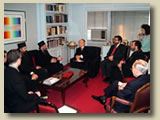 Bishop
Teodosije informed Rabbi Schneier and his associates with the
situation in Kosovo and Metohija. He stressed the fact that the
Church in Kosovo and Metohija with Bishop Artemije firmly opposed
violence, regardless of what side it came from, as a method of
resolving problems and that it helped people of other nationalities
and faiths. "We are the guardians of our churches and of
our people. However, we have a sense of responsibility toward
our neighbors as well and we wish to live with them in peace and
mutual respect," said the Bishop. He added: "In Kosovo
and Metohija today there is still no rule of law and adequate
security. Serbs are still living in enclaves. A year ago Serbian
Orthodox churches and monasteries were exposed to yet another
wave of destruction such as the world has not seen for some time.
In addition to the 120 churches destroyed prior to March 2004,
in just two days 30 more were destroyed, among them several old
churches built in the Middle Ages. More than 4,000 people were
expelled from their homes, and 19 were killed." Bishop Teodosije
emphasized that the Church does not want political solutions to
affect our survival; instead, it is in the Church's interest for
all expelled Serbs to return and to live normally with other communities.
In order for this to become possible, said the Bishop "Serbs
need certain rights and protective measures, and our monasteries
need internationally guaranteed protection. Otherwise, there is
a possibility that a centuries-old Christian civilization and
people that created on the territory of Kosovo and Metohija will
vanish forever." At the end of his remarks, Bishop Teodosije
said that Kosovo and Metohija are to the Serbs what Jerusalem
is to the Jews, and that the holy shrines located there are the
soul of the Serbian people. Bishop Teodosije asked Rabbi Schneier
to use his influence and good name to protect the Serbian people
and its holy shrines in Kosovo and Metohija, regardless of its
final political status. Bishop
Teodosije informed Rabbi Schneier and his associates with the
situation in Kosovo and Metohija. He stressed the fact that the
Church in Kosovo and Metohija with Bishop Artemije firmly opposed
violence, regardless of what side it came from, as a method of
resolving problems and that it helped people of other nationalities
and faiths. "We are the guardians of our churches and of
our people. However, we have a sense of responsibility toward
our neighbors as well and we wish to live with them in peace and
mutual respect," said the Bishop. He added: "In Kosovo
and Metohija today there is still no rule of law and adequate
security. Serbs are still living in enclaves. A year ago Serbian
Orthodox churches and monasteries were exposed to yet another
wave of destruction such as the world has not seen for some time.
In addition to the 120 churches destroyed prior to March 2004,
in just two days 30 more were destroyed, among them several old
churches built in the Middle Ages. More than 4,000 people were
expelled from their homes, and 19 were killed." Bishop Teodosije
emphasized that the Church does not want political solutions to
affect our survival; instead, it is in the Church's interest for
all expelled Serbs to return and to live normally with other communities.
In order for this to become possible, said the Bishop "Serbs
need certain rights and protective measures, and our monasteries
need internationally guaranteed protection. Otherwise, there is
a possibility that a centuries-old Christian civilization and
people that created on the territory of Kosovo and Metohija will
vanish forever." At the end of his remarks, Bishop Teodosije
said that Kosovo and Metohija are to the Serbs what Jerusalem
is to the Jews, and that the holy shrines located there are the
soul of the Serbian people. Bishop Teodosije asked Rabbi Schneier
to use his influence and good name to protect the Serbian people
and its holy shrines in Kosovo and Metohija, regardless of its
final political status.
Responding
to Bishop Teodosije, Rabbi Schneier emphasized that the Serbs
must remain in Kosovo. "I have been to Kosovo and I know
that Pec was the seat of your Church. You have the legitimate
right to preserve your heritage." Rabbi Schneier recalled
that last year he and Bishop Artemije visited Kofi Annan together
and informed him regarding the March destruction of holy shrines.
Rabbi Schneier was especially shocked by the destruction of the
old town of Prizren and its churches, which he compared with the
torching of the synagogue in Vienna on the eve of World War II.
Bishop
Teodosije explained to Rabbi Schneier that the situation has not
essentially changed for the better because the influence of corruption
remains great and the rule of criminal activity. "Those Albanians
whom we helped are still afraid of visiting us, and we still cannot
freely travel or move about anywhere in Kosovo without a KFOR
military escort. Our greatest priority is the return of refugees
and securing conditions for a normal life for them and jobs,"
concluded the Bishop.
Continuing
the conversation, Rabbi Schneier emphasized the need to restore
the destroyed churches in Kosovo and Metohija. Consequently, Father
Irinej Dobrijevic informed him of the recently signed Memorandum
according to which the Kosovo Government undertakes to compensate
the restoration of the destroyed churches and monasteries. Fr.
Irinej underscored that this act was especially supported by US
Senator George Voinovich and other congressmen who understand
the difficult position of the Serbs. "This will open the
door to other donations. A donors' conference has already been
scheduled for May where we will hope to secure additional funding,"
explained Fr. Irinej. He emphasized that it is especially important
to coordinate returns with the restoration of holy shrines, and
thus provide returnees with an income to sustain life.
Rabbi
Schneier wholeheartedly welcomed the signing of the Memorandum
and emphasized that it was necessary to take advantage of the
good will of the international community. He especially stressed
the need for institutional protection of the churches and monasteries,
which in his opinion is an international obligation. Rabbi Schneier
also agreed with the proposal of Professor Sijakovic that religious
buildings confiscated in Sarajevo be returned to the Serbian Orthodox
Church and the Jewish community.
At
the conclusion of the meeting, Rabbi Schneier proposed the organization
of a conference in Belgrade in cooperation with the Serbian Orthodox
Church that would include the Patriarchs of Moscow and Constantinople,
and all spiritual leaders in the Balkans. His Appeal of Conscience
Foundation held a similar conference in Ochrid where are good
foundation for future cooperation was successfully established.
Bishop Gregorije heartily welcomed this proposal as a good solution
toward better cooperation, adding that he would brief the Holy
Synod of Bishops and the Patriarch of the Serbian Orthodox Church.
After
the meeting a group of Jewish children sang a song for the guests,
and after luncheon Rabbi Schneier escorted them on a tour of his
synagogue.
Upon
parting from his guests, Rabbi Schneier expressed his special
thanks to His Holiness the Serbian Patriarch and the Holy Synod
of Bishops for their clear and firm condemnation of anti-Semitic
incidents in Serbia, and said that he hoped that cooperation between
the Serbian Orthodox Church and the Jewish community would continue
and intensify in the future.

VISIT
TO ST. VLADIMIR
ORTHODOX THEOLOGICAL SEMINARY IN NEW YORK
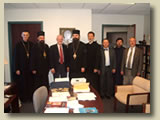 The
afternoon of Tuesday, March 29, the delegation of the Serbian
Orthodox Church visited St. Vladimir Orthodox Theological Seminary
where they were received by Dean John Ericsonn and two other professors,
one of whom the son of the renowned theologian John Meyendorff. The
afternoon of Tuesday, March 29, the delegation of the Serbian
Orthodox Church visited St. Vladimir Orthodox Theological Seminary
where they were received by Dean John Ericsonn and two other professors,
one of whom the son of the renowned theologian John Meyendorff.
The
members of the delegation and professors of St. Vladimir Theological
Seminary discussed the situation in Kosovo and Metohija, as well
as the need for developing ties among the Orthodox global community.
Ethnophiletism was highlighted as one of the greatest obstacles
to Orthodox unity. Dean Ericsonn emphasized that the Church "must
not allow itself to become a state institution but always remain
independent and think primarily of the interests of its faithful".
He observed that ethnophiletism is especially evident in the United
States but also exists in the traditionally Orthodox countries.
Professor
Sijakovic stressed that the Serbian Orthodox Church wants an active
role in the integration process in the Balkans but that it wants
to take part in this process as the Church, not as a state institution.
Other issues of special concern to the Church include the restitution
of confiscated property, i.e. the return of religious sites nationalized
by the state during the Communist period.
Later
in the conversation, Bishops Grigorije and Teodosije spoke with
the Dean and his colleagues on theological themes, remembering
Father John Meyendorff of blessed repose, whose works are very
read among Orthodox youth in Serbia. After the meeting the delegation
toured the chapel, library and the entire seminary complex. At
the conclusion of the visit, the delegation attended evening religious
services in the chapel of the Three Holy Hierarchs.

MOSCOW
TO VENERATE HOLY RELICS OF ST ALEXIOS
 The
head of St. Alexios, the Man of God, one of Eastern Christendom's
most worshipped saints, will be delivered from Greece to Moscow's
Novospassky Monastery with the blessing of Alexey II, the Patriarch
of Moscow and All Russia, advised the monastery Council of Trustees.
The holy relics will be open for veneration at the monastery from
March 29 to April 1 from 8 a.m. to 8 p.m. each day. On April 2,
the relics will be removed to the Cathedral of Christ the Savior,
Moscow's principal shrine, where they will spend the night prior
to returning to Greece. The
head of St. Alexios, the Man of God, one of Eastern Christendom's
most worshipped saints, will be delivered from Greece to Moscow's
Novospassky Monastery with the blessing of Alexey II, the Patriarch
of Moscow and All Russia, advised the monastery Council of Trustees.
The holy relics will be open for veneration at the monastery from
March 29 to April 1 from 8 a.m. to 8 p.m. each day. On April 2,
the relics will be removed to the Cathedral of Christ the Savior,
Moscow's principal shrine, where they will spend the night prior
to returning to Greece.
Born
into a pious patrician family in Rome in the middle of the fourth
century, Alexius ran away from home as a young man, leaving his
parents and bride, to take up religious asceticism. After years
of wanderings and mystical contemplation, he returned unrecognized
to receive alms and meals with the beggars who flocked to his
charitable parental home. Servants made the meek pilgrim a laughing-stock.
He withstood their scoffing for seventeen years, disclosing his
identity only on his deathbed to his disconsolate wife, father
and mother.
Alexios
died on March 30, 411. His sanctity and spiritual grandeur were
miraculously revealed to the Emperor, the Bishop of Rome and the
congregation during liturgy that day. The modest ascetic is recorded
in Christian tradition as the Man of God. The Church commemorates
him on March 30.
Many
miraculous healings by St. Alexios' relics have been registered.
The saint's head is preserved in the renowned monastery of the
Great Lavra, founded in 961 in the Peloponnesian town of Kalabreta.
It has never left the Great Lavra since the Emperor Emmanuel Palaeologus
presented it as a gift to the monastery in 1398.
The
Novospassky Monastery will serve a commemorative liturgy in honor
of St. Alexios on March 30 and Patriarch Alexey II will serve
another at the Cathedral of Christ the Savior on April 3.
Source:
Russian Information Agency Novosti

[Serbian
Translation Services]
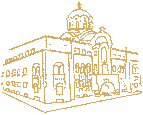
Copyright © 1999-2004 by
The Information Service of the Serbian Orthodox Church
11000 Belgrade
Kralja Petra I no.5
+381 11 3282 596
e-mail
|

